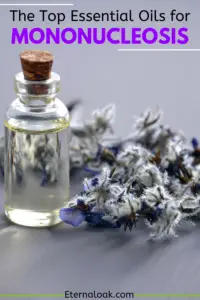Do you feel tired for no reason? You might have infectious mononucleosis, a type of virus that can take a while to recover from.
There is no specific cure for mono, but essential oils can help you deal with the symptoms while you fight off the virus.
Table of Contents
What is Epstein-Barr/Mononucleosis (Mono)?
This illness comes with many names. Sometimes it’s called mononucleosis, mono, glandular fever, or Epstein-Barr syndrome. There are even people who refer to it as “the kissing disease.”
Basically, mono is an infection of the Epstein-Barr virus. This contagious virus spreads through saliva, so people can get it from sharing food, kissing, or being near a sneezing or coughing person.
Because mononucleosis is a viral disease, it cannot be easily fixed with antibiotics. The only treatment for this disease is just staying comfortable while you wait for your body to heal.
Symptoms of Mono
It usually takes about four to six weeks for symptoms to start showing up after you are infected by the virus (1). Symptoms can vary quite a bit. Some people may feel very ill while others feel fine.
You may encounter one or more of these symptoms:
- Fever
- Sore throat
- Extreme fatigue
- Headaches
- Aching muscles and joints
- Swollen lymph nodes
- Skin rash
- Enlarged liver or spleen
Most of the symptoms resolve within two to four weeks, but the deep fatigue can be hard to beat. It often lasts up to six months. Some people report still feeling fatigued years after their infection.
7 Essential Oils for Mono
Essential oils cannot entirely cure mono, but they can help address several of the symptoms. Thyme and eucalyptus oil are very helpful for the sore throat that comes with mono.
2010 research found that tea tree, galbanum, and thyme oils are particularly helpful at boosting antiviral activity (2).
Fatigue can be reduced with basil and peppermint essential oils while headaches can be eased with lavender oil.
Coconut Oil for Mono
Coconut oil helps mono patients in multiple ways. As Penn State’s medical center explains, this healthy source of fat helps to create strong, functional immune system cells (3).
It is also useful because many people with mono get a type of uncomfortable, rash. Skin gets flat, red lesions that can cover the torso, arms, legs, or even face.
Smoothing coconut oil over these areas can help to moisturize dry skin and reduce itching. This is very important because it keeps people from scratching until they get skin damage.
Herbs for Mononucleosis
Herbal remedies for mononucleosis primarily focus on strengthening the immune system. Theoretically, they can help the body produce stronger antiviral reactions, so it can fight off the infection faster.
Green tea, echinacea, astragalus, and cranberry are the four most effective herbs. Studies have shown that all of these can greatly boost your immune system functioning (3).
They can be effective when made into teas, sprinkled into foods, or turned into extracts.
How to use Essential Oils for Mononucleosis
How you use an essential oil for mononucleosis will depend on the type of oil you are using. Some oils can only be smelled. Read the instructions carefully to see if it safe to ingest or apply on skin.
For oils that are meant to boost the immune system, the usual method is mixing a drop or two into water and drinking it.
Oils that help soothe headaches and give you energy are often put in diffusers to smell, or they may be rubbed on the skin.
Side Effects of Essential Oils
Most side effects of essential oils come from using them improperly.
Some oils can give you a rash if you put too much on your skin. Others can cause an upset stomach when you ingest them. Overuse of oil diffusers may lead to some breathing problems.
They can be powerful medications, so always consult with your doctor before you begin using an oil. Always research the oil to find the right dose and see if it is safe to consume, apply, or smell.
Essential Oil Mono FAQ
Still wondering how essential oils work for mono? Read the answers to these frequently asked questions.
How to use homeopathy for Epstein Barr/Mono?
No research has found homeopathy can cure mono directly. However, a 2004 study found that taking homeopathic remedies may help to improve the headaches some mono patients have (4).
When should you see a doctor?
Mono can occasionally cause severe complications like pericarditis, anemia, encephalitis, or hepatitis, so it is important to have a doctor monitoring your recovery.
Signs you might be dealing with one of these complications and need emergency medical care include shortness of breath, yellow skin, severe stomach pain, chest pains, or loss of consciousness.
How can I get rid of mono fast?
Sadly, there’s no way to instantly get rid of mono. All you can do is try to stay healthy and boost your immune system to fight off the virus quicker.
Getting plenty of sleep, eating nutritious food, avoiding alcohol and tobacco consumption, and taking helpful essential oils and herbs may speed up your healing time.
How do you treat Epstein Barr naturally?
Treating mono naturally mostly just involves avoiding painkillers and other synthetic medications.
Instead, natural treatments rely on using essential oils and herbs to manage symptoms.
Can you go to school if you have mono?
You can go to school if you feel up for it, but it may take a few weeks for you to feel well enough for school.
What causes mono flare ups?
This rare occurrence can happen when the virus remains dormant for years before reactivating. Stress, overexertion, or immune system problems may trigger flare ups.

Sources
(1) https://www.mayoclinic.org/diseases-conditions/mononucleosis/symptoms-causes/syc-20350328
(2) https://www.ncbi.nlm.nih.gov/pubmed/19653195
(3) http://pennstatehershey.adam.com/content.aspx?productId=107&pid=33&gid=000109